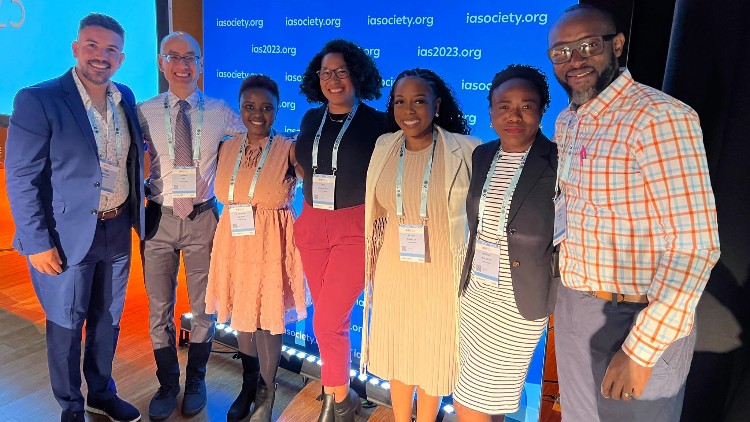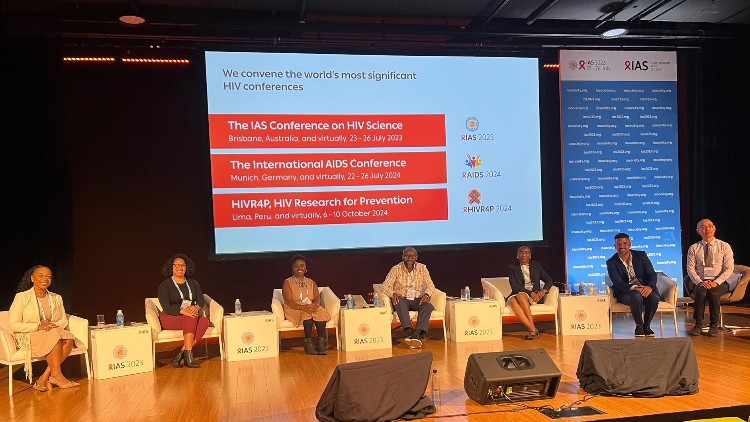In Brisbane, Australia, five HISTP fellows presented their work about the continuum of care for vulnerable populations in HIV intervention science.

This year, five of SIG’s HIV Intervention Science Training Program for Underrepresented New Investigators (HISTP) fellows attended the 12th annual International AIDS Society Conference (IAS 2023) in Brisbane, Australia. HISTP, a multidisciplinary training program funded by the National Institute of Mental Health, works to facilitate the growth of scientists from underrepresented groups that conduct HIV-related research. Dr. Omar Martinez, a consultant and mentor for the fellowship who attended IAS 2023, emphasized that “HISTP provides ongoing research support and mentorship for underrepresented minorities in HIV prevention and care research. Fellows are exposed to a wide range of opportunities including research support through the summer and winter institutes, grant writing and career development.”
“Programs like HISTP are needed in order to redress the multiple--often entrenched--systemic and institutional challenges experienced particularly by early career scientists of color,” says Dr. Elwin Wu, a co-director of SIG and HISTP at Columbia School of Social Work who serves as one of the PIs, along with Dr. Nabila El-Bassel, for the grant that funds HISTP and attended IAS 2023 with the fellows.
The HISTP fellows are based at universities and other institutions around the United States, holding faculty roles in medicine, social work, public health, and more. At IAS 2023, their presentations focused on the roles of technology, community engagement, and the continuum of care for vulnerable populations in HIV intervention science. The work of Jaih Craddock, Caroline Kingori, Peter Memiah, Megan Threats, and Melanie Walcott is “innovative and promising, and will help leverage technology and community engagement for the next generation of HIV prevention interventions,” said Dr. Wu.

Following the conference Caroline Kingori and Peter Memiah spoke with SIG about their experiences at IAS 2023 and as HISTP Fellows. Answers have been edited and condensed for clarity.
Dr. Caroline Kingori
Dr. Caroline Kingori is the Associate Dean for Research and Faculty Affairs at the College of Health Sciences and Professions at Ohio University. Her research is primarily focused on prevention of HIV/AIDS in ethnic minorities, including people of African descent, communities of color, immigrants, migrants, and refugees. By delving into the complexities of sexual behaviors, risk factors, and innovative prevention strategies like using video games to educate young adults about HIV prevention, her research enhances our understanding of HIV transmission dynamics and emphasizes the importance of tailored approaches in mitigating the impact of the HIV epidemic globally and locally.
What do you think is the most important thing for people to know about the presentation you made at IAS 2023?
I had the opportunity to present a project titled “Enhancing HIV Prevention for Immigrant and Refugee Youth in the US through Immersive Interactive Technology." This technology, referred to as a digital choose-your-own-adventure film, immerses users in realistic situations related to HIV prevention. Our creation, called DatingForward, serves as a potent tool to educate and empower 18- to 25-year old immigrants and refugees about their decisions in dating and relationships. By enabling participants to navigate diverse scenarios and witness the outcomes of their choices, we've successfully merged engaging storytelling with effective HIV prevention education.
More about DatingForward
How have the developmental funds from HISTP helped you achieve your goals?
The developmental funds provided by HISTP played a pivotal role in the conception and execution of the New American Youth Health Resource website. This hub not only hosts our interactive film but also functions as a user-friendly platform offering accurate health information tailored to our specific audience, on topics from STIs to mental health to peer pressure.
What other support have you received as you do this work?
Being part of a dedicated group of HIV prevention researchers has brought invaluable camaraderie and emotional reinforcement. Furthermore, the financial assistance from HISTP, which facilitated my participation in conferences and workshops, and covered article processing fees, enabled me to share my research. Engaging with HISTP mentors has played a pivotal role in enhancing the quality of my research.
What’s been most valuable to you about HISTP? What do you think is most valuable about HISTP to the field of HIV research?
HISTP is an incredible community that has elevated my research to new levels. It connected me to a vibrant community of researchers of color, which is not always easy to find. Additionally, HISTP's association with researchers and its network of mentors has exposed me to groundbreaking work that often goes unnoticed, especially from researchers of color. For junior researchers seeking guidance and collaboration, HISTP offers an enriching environment that empowers them to make a meaningful impact in the field of HIV prevention.
What’s something fun you got to do at IAS 2023?
While in Brisbane, I took some time to go see koala bears and kangaroos. This was a bucket list item I have wanted to accomplish for a long time. I was surprised to learn that koala bears sleep up to 20 hours a day.
Dr. Peter Memiah
Dr. Peter Memiah, Professor of Global Health at the University of Maryland, Baltimore, conducts research that applies implementation science approaches in the areas of gender-based violence (GBV), HIV integration, adolescent health, community engagement, digital interventions, and health workforce development. Because of the high prevalence of GBV worldwide, he is working with a team of experts to develop an artificial intelligence powered GBV symptoms checker chatbot that can offer users immediate prevention and response services recommendations.
What is the most important thing for people to know about your presentation at IAS 2023?
From qualitative investigations this year, which used focus groups composed of participants from vulnerable groups, we determined that embracing a human-centered methodology when crafting a proficient chatbot, incorporating numerous human-like attributes, plays a pivotal role in enhancing usage. This approach also aims to bridge the disparities experienced by marginalized or vulnerable communities at a higher risk of experiencing GBV. Additionally, it contributes to curbing the prevailing GBV crisis by making prevention and support services promptly accessible.
How have the developmental funds from HISTP helped you achieve your goals?
The developmental fund will allow local groups in Kenya to design interventions specifically tailored to the unique challenges and opportunities within our communities, and it will support participatory decision-making at the community level to enhance research and health outcomes. This will promote a sense of civic responsibility and active citizenship. Overall, this funding aligns with community-driven development, self-determination, and sustainability principles.
What other support have you received as you do this work?
HISTP has supported me in enhancing progressive collegial relationships, navigating academia, providing resources, guidance, and opportunities that have helped me excel in my roles. Here are some ways I have been supported: professional development workshops, mentorship programs, research funding support, collaborative research opportunities, tenure and promotion guidance, work-life balance, community engagement, and conflict resolution support. I have found the HISTP program to have open communication and be able to tailor support initiatives to my individual goals and circumstances.
Tell me something you learned or got to do at IAS 2023 that you thought was fun or interesting or that more people should know.
IAS provided strong evidence for HIV implementation. There were social events, themed parties, cultural performances, and interactive exhibits that allowed attendees to have fun while engaging in important discussions about HIV/AIDS research and response. These elements helped create a balanced and dynamic conference experience. We also got to bond and share our experiences. It’s always fun and helps build a sense of brother/sisterhood.
